HAVE vs. HAVE GOT The Difference Between HAVE & HAVE GOT 7 E S L

GOING TO STUDY ENGLISH!! HaveHave got
The words "got" and "have" both indicate ownership or possession. Use "I have" in formal written English, as contractions are used for conversational speaking. "I got" is the most informal version because it removes the word "have" completely. What Does "I Got" Mean? You say "I got" when you want to indicate that you are in possession of something.
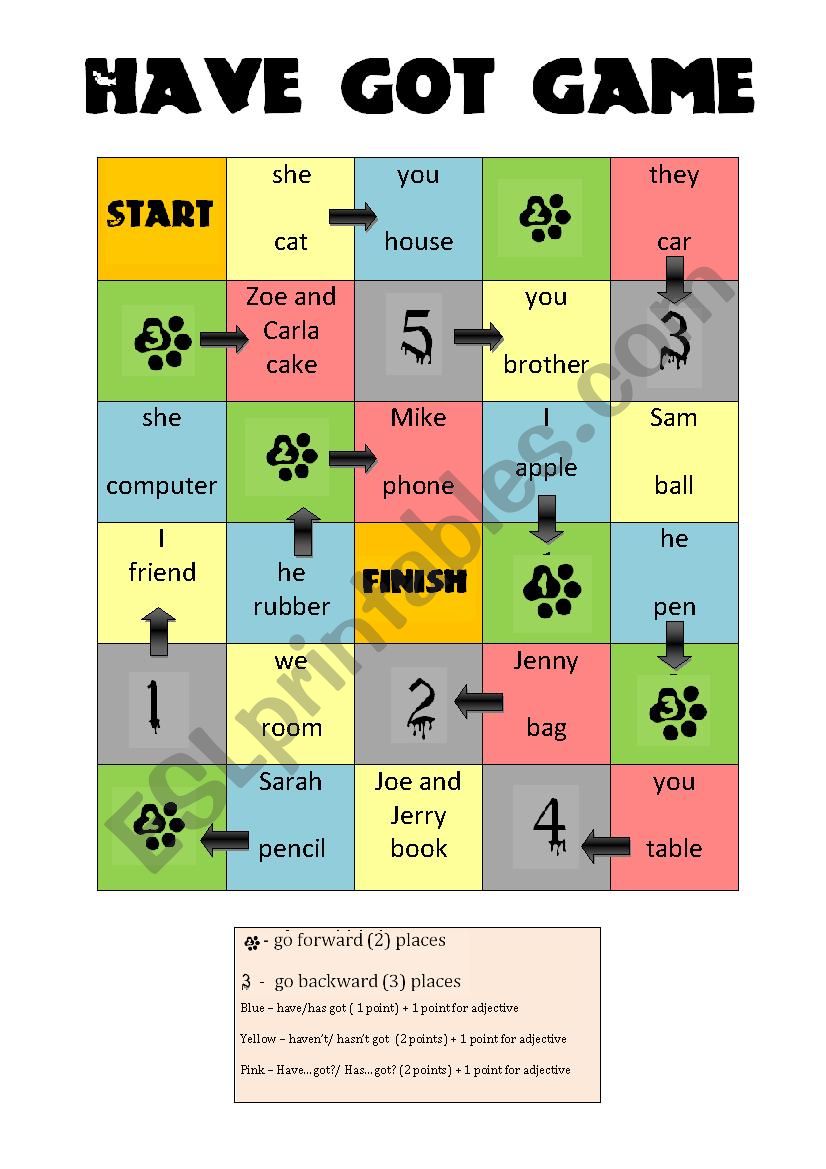
Have got game ESL worksheet by kamlota
Grammar explanation We use I/you/we/they + have got or he/she/it + has got to talk about things that we have. In many situations, have and have got mean the same thing. Have got is a little less formal than have. We often use have got more in speaking and have more in writing. They have got a big garden. = They have a big garden.

English Grammar When to Use "Have Got" English Teacher Melanie
: haveused in present tense situations usually in informal writing and in ordinary speech. I sent the package to him yesterday. I hope he has got it. It's getting late. We've got to go. Examples of have got in a Sentence Recent Examples on the Web And Democrats and Republicans have got to come together to make sure that doesn't happen.

English Grammar Have and Have Got ESLBUZZ
The have got forms are more common in an informal style. Have got has the same meaning as have and both are used as present tenses. Note that have got is NOT the present perfect of get. To make.

Structure ‘have vs have got’ Fly High English
c. 've got. Exercises: 1 2 3. The verb "have got" is common in British English. It is basically used to express possession or in descriptions. In American English, they use the verb "have". Check our complete grammar explanation and do the online exercises. A1-A2 English grammar online.

Have got, has got Interactive worksheet Learn english, English
Have got is more informal. We use have (got) here to refer to both verbs: I've got a terrible pain in my back. I have a terrible pain in my back. (more formal) They haven't got a car. They don't have a car. (more formal) We use have ( got) to talk about possession, relationships, characteristics and illnesses.
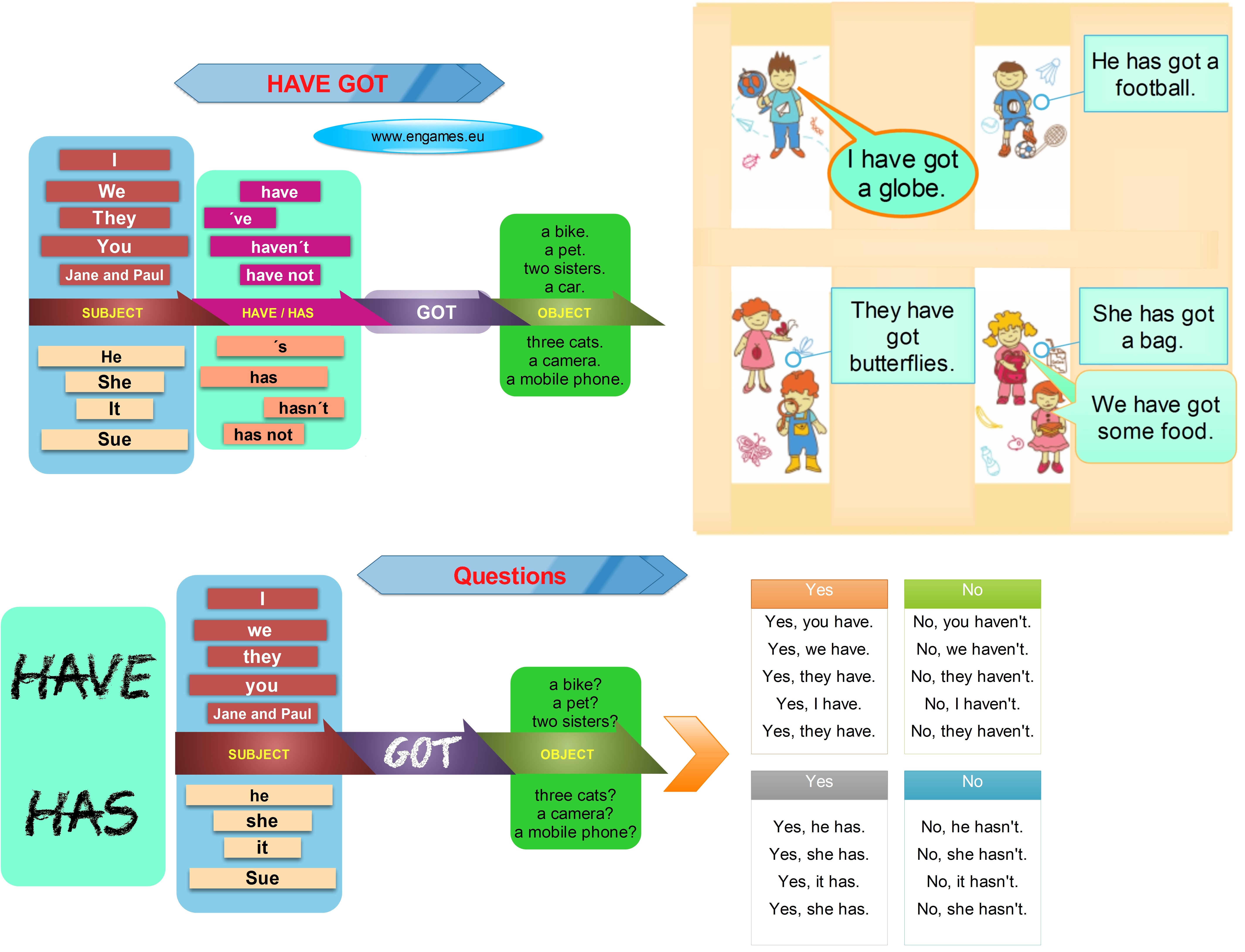
The verb have got Games to learn English Games to learn English
Have got (have/has + got) is used to talk mainly about possessions or personal attributes. Give me some examples, please. Certainly, here you are: I've got a new computer. They haven't got any red chilli peppers. She's got long, brown hair. He hasn't got many friends. So the negative is have/has + not + got? Yes, but don't forget the contraction.
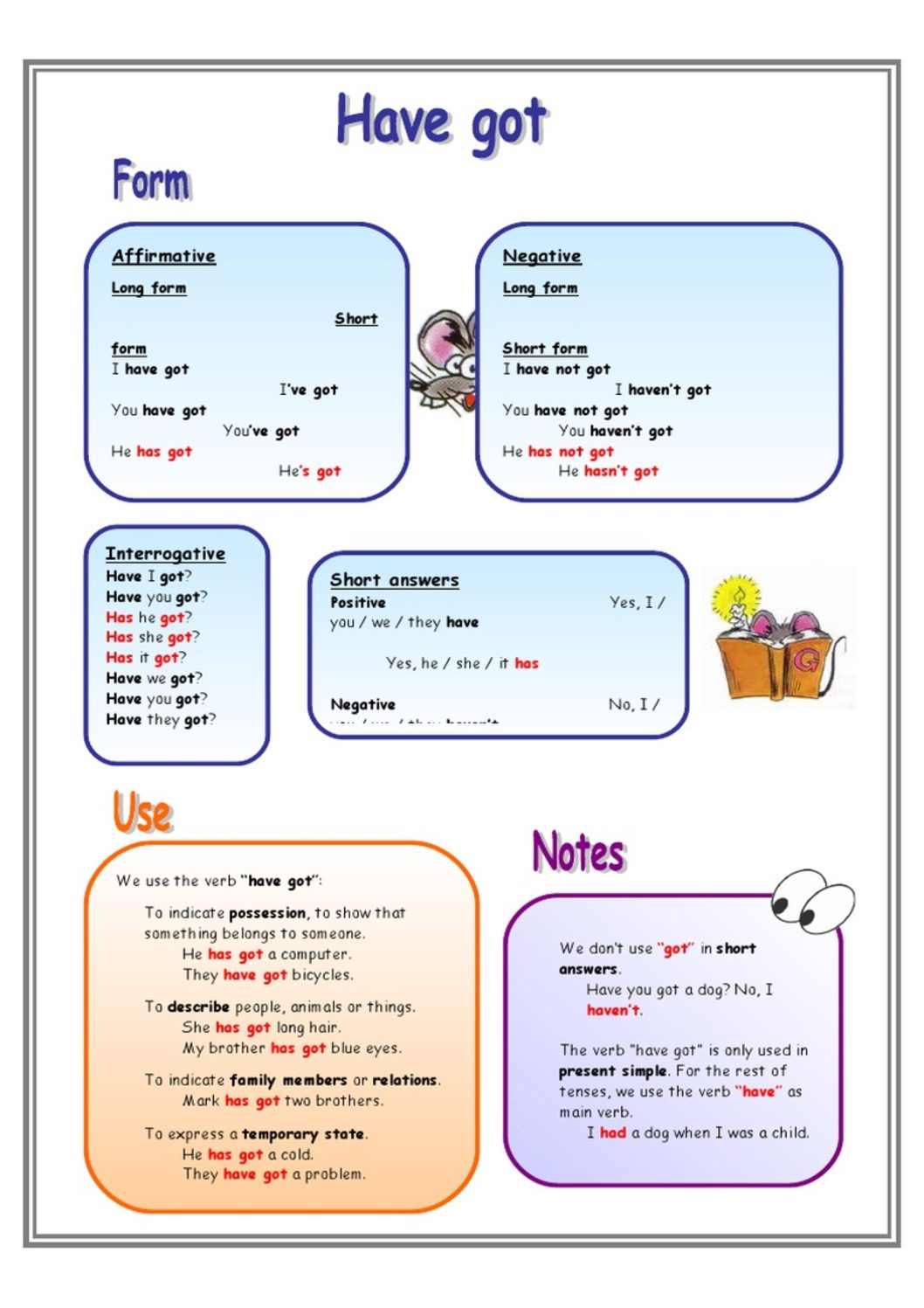
Grammar Have Got Teacher Raff
How to use it Use have for I, you, we and they. Use has for he, she and it. We can contract the verb, especially when we're speaking. I have got long hair. = I've got long hair. He has got a new computer game. = He's got a new computer game. We have got a rabbit. = We've got a rabbit. For negatives, use not after have or has.

Have vs. Have Got Difference Between Have & Have Got • 7ESL
7.8k. Understanding the difference between "have" and "have got" can be a bit tricky at first, but it's quite simple once we get the hang of it. Both expressions are commonly used to denote possession, but the way we use them can vary. In general, "have got" is more informal and usually preferred in British English, while "have.

Verb HAVE GOT questions and short answers Games to learn English
37 I have looked through several questions and answers on EL&U, and often there is an indication that American English prefers "have" while British English prefers "have got". In addition, there are several references to "have got" being more informal than "have" (e.g.: When to use "have" and "have got", "Do you have" vs "Have you got" ).
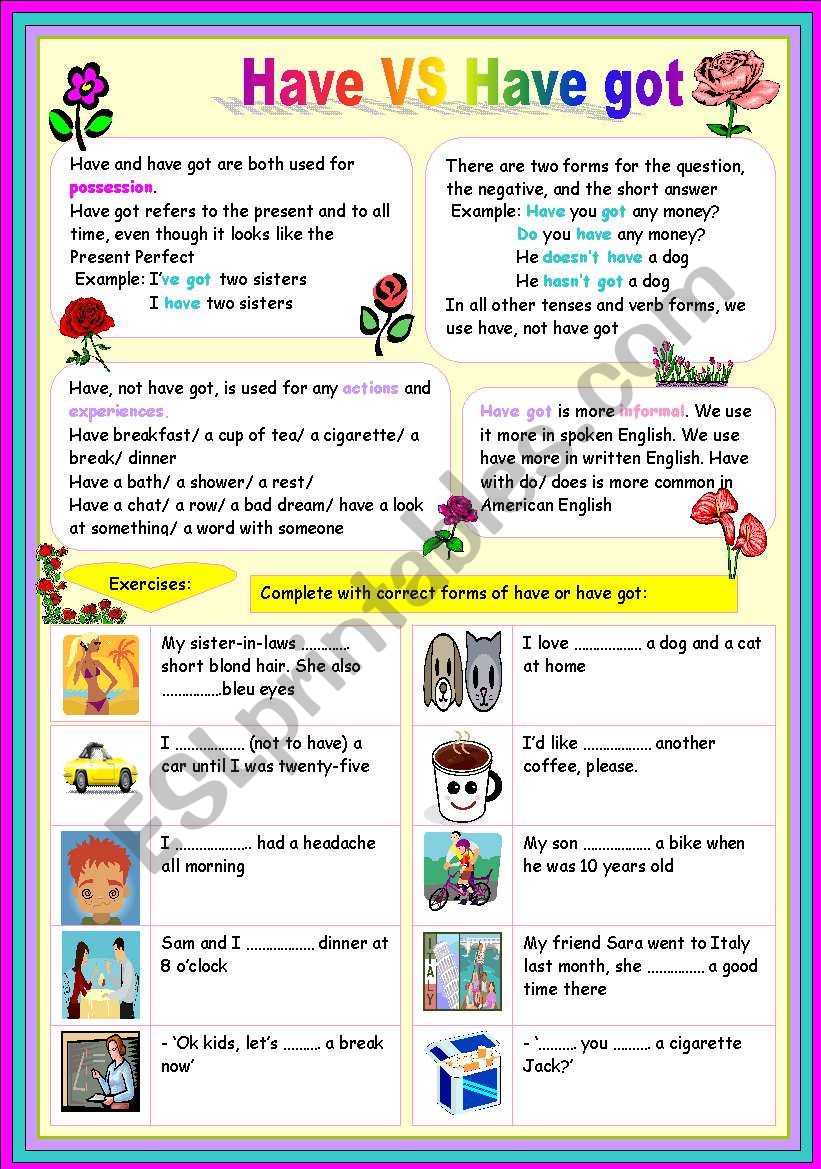
to have or to have got ESL worksheet by ben 10
1.In the past and present tense, "have" and "got" are used differently. 2."Have" refers to owning something and "got" refers to receiving something. 3."Have" is used to refer to actions; "got" is not used to refer to actions or experiences. 4.The contracted form is used only for "have got" in the positive form not.
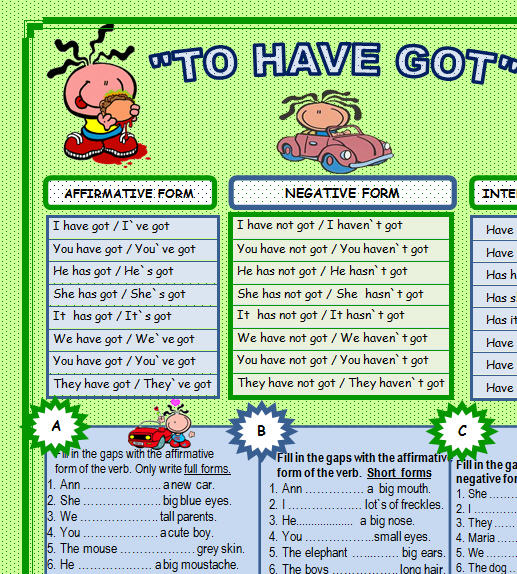
Have Got Worksheet
Have gotten has three different possible meanings in American English: have obtained, have become, and have entered. Below are some examples of each, including contractions with have/has + gotten, which are common. HAVE GOTTEN = have obtained I've gotten a lot of compliments on this hat. Anita could have gotten a job anywhere she wanted.
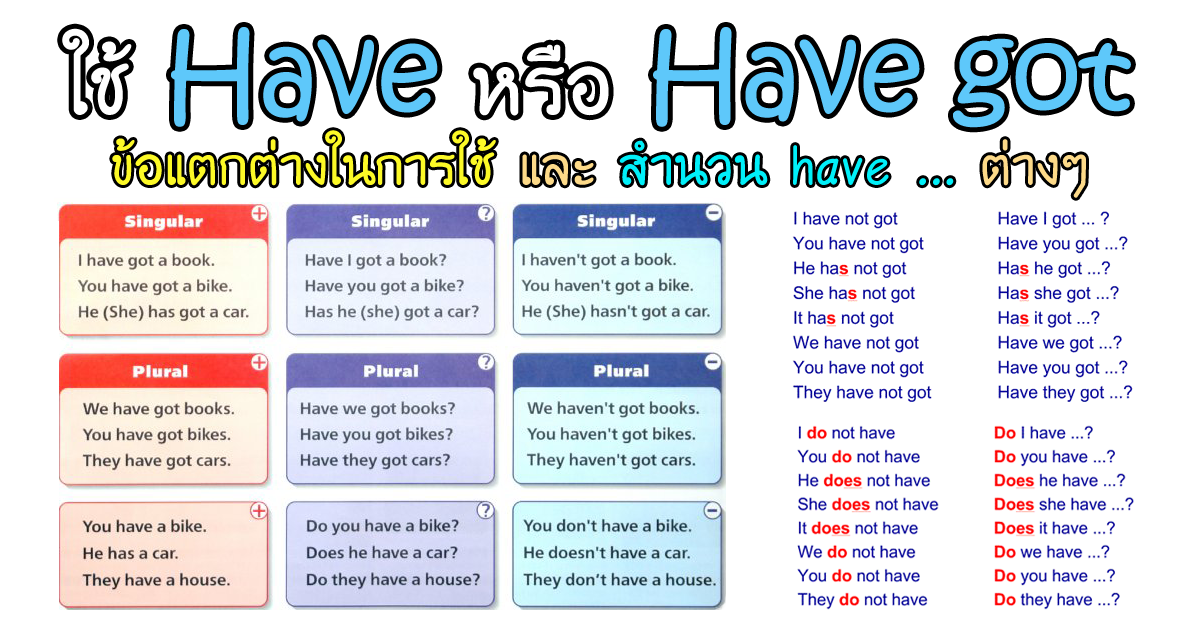
การใช้ have กับ have got ต่างกันอย่างไร การทำเป็นคำถาม ปฏิเสธ สำนวน
A) To have an opportunity. We use got to (without have) to say that we had an opportunity to do something. For example: The children got to stay up late and watch a movie. (Their parents let them; they gave them this opportunity) George was sick, so he got to go home early. (His boss gave him this opportunity)

Difference Between Has and Have KarleehasCline
Have and have got are usually possible with little or no difference of meaning. Both forms can be used to express ideas such as possession and relationships. For example, the two sentences given below express the same idea. I have a sister. = I have got a sister. Got forms of have are informal, and are most common in the present.

HAVE vs. HAVE GOT The Difference Between HAVE & HAVE GOT 7 E S L
Vocabulary 7 min read Grammar:How to Use Have or Have Got + Example Sentence Updated: 2 days ago 1. 'have ' vs 'have got' - What's the difference? - They both have the same meaning. e.g I have a cat. / I have got a cat. *Note: i) 'have got' is more conversational & less formal. It's also more common in British English. 2.

Have Got
Here's the main difference between have and have got: generally speaking, Have is more common in North America and have got is more common in the United Kingdom. Have got forms are informal, and they're also most common in the present. Keep reading to learn more about the different uses of have and have got . Teaching English Just Got Easier!